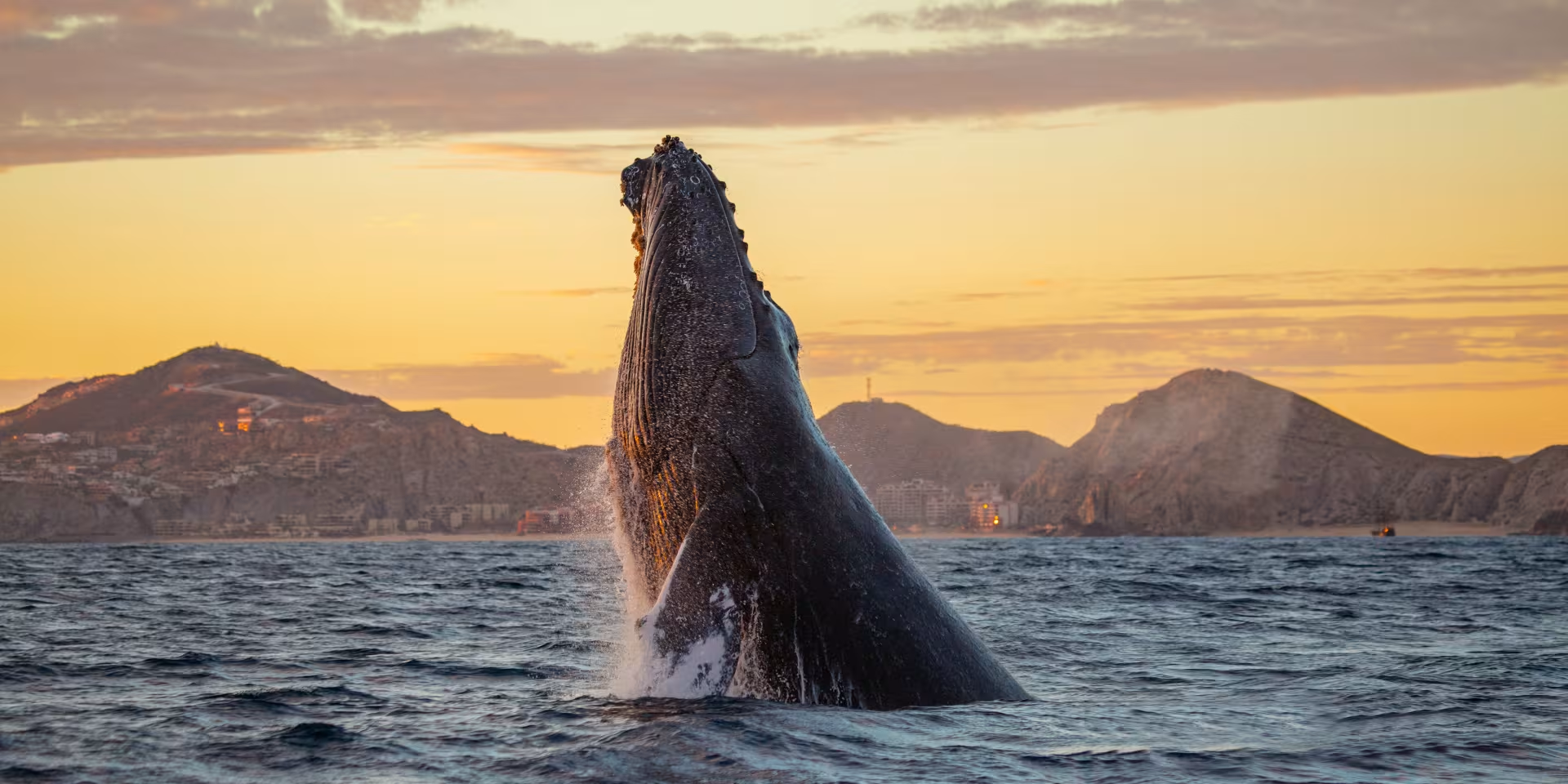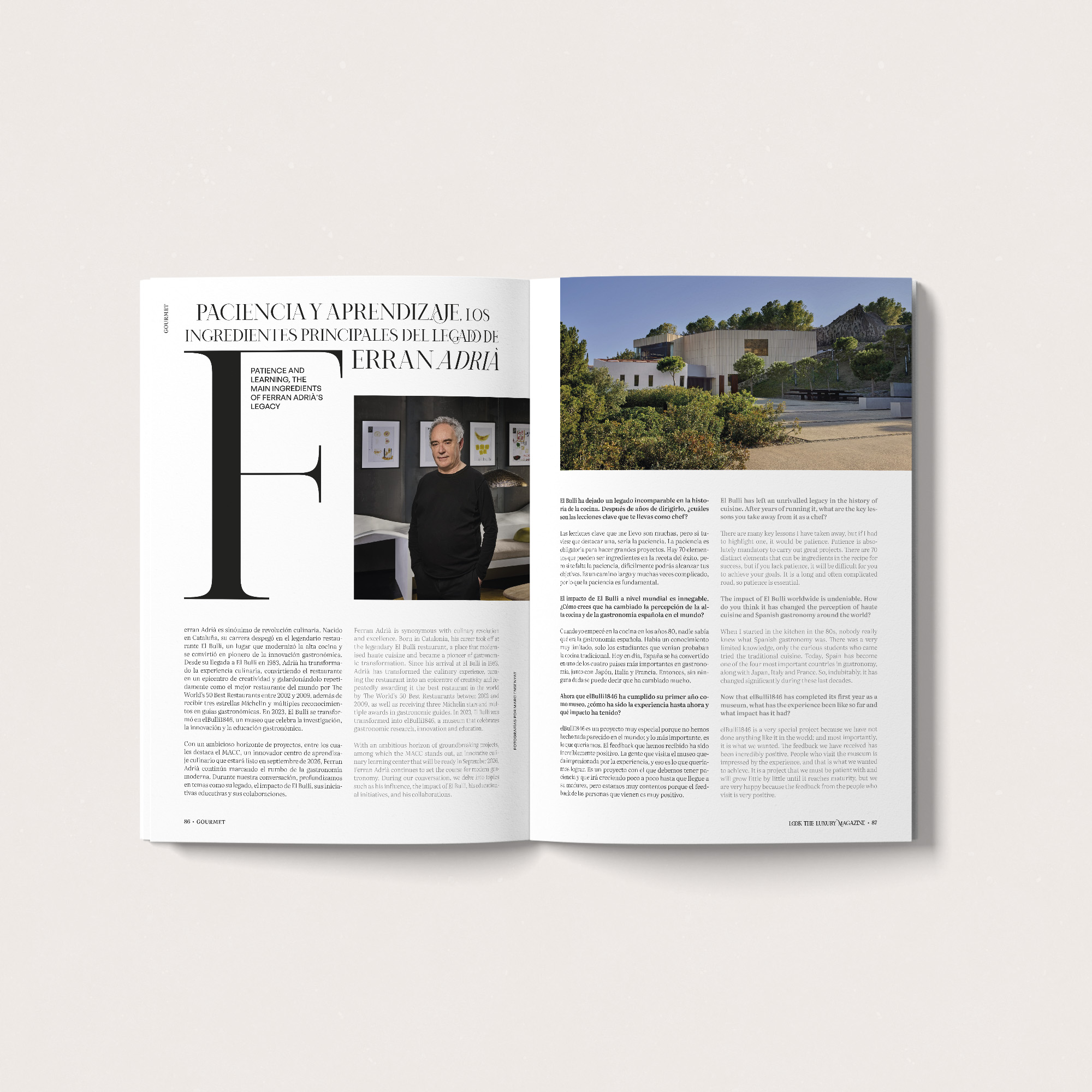Located on the southern tip of the Baja California peninsula, Los Cabos has established itself as one of the most exclusive and sustainable destinations in Mexico. With an incomparable offer that combines luxury, nature, culture and history, this privileged enclave has managed to differentiate itself by opting for quality over quantity. Its breathtaking landscapes, where the desert meets the sea, its unique biodiversity – including the iconic Cabo Pulmo National Park, a UNESCO World Heritage Site – and its firm commitment to sustainability, have positioned Los Cabos as the epitome of silent luxury: an authentic, personalised experience in harmony with the environment. The destination’s recent inclusion in Mexico’s first MICHELIN Guide, with one star for Grand Velas Los Cabos and two prestigious Green Stars for the sustainable excellence of its restaurants, confirms its place among the world’s gastronomic elite.
Leading the tourism promotion of this fascinating destination is Rodrigo Esponda, General Director of the Los Cabos Tourism Trust since 2016. With more than two decades of experience in the tourism industry, Rodrigo has played a key role in projecting Los Cabos as a global benchmark for sustainable luxury. His career includes leadership positions at the Mexico Tourism Board, where he coordinated strategies for the North American market, as well as at the National Tourism Development Fund.
In this interview we talk to Rodrigo Esponda about the present and future of Los Cabos, its commitment to excellence and authenticity.
In your opinion, Rodrigo, what makes Los Cabos a unique destination?
Its privileged location at the southern tip of the Baja California peninsula creates a fascinating contrast between the desert and the sea, with spectacular landscapes that offer unparalleled natural beauty. Here, visitors can enjoy the imposing presence of the Pacific Ocean and the Sea of Cortez, whose waters are home to exceptional marine biodiversity, including the Cabo Pulmo National Park, a UNESCO-protected ecosystem that is home to one of the oldest coral reefs on the continent.
But beyond its natural beauty, Los Cabos has differentiated itself by focusing on quality over quantity, offering responsible and conscious tourism. The region has adopted an approach focused on sustainability, ensuring that its tourism development respects the environment and benefits local communities. A clear example of this commitment is sport fishing, a key activity in the region that not only boosts tourism, but also supports marine biodiversity by promoting responsible catch and release practices, thus protecting local species and marine ecosystems.
In addition, the destination receives mostly tourism from the United States, representing 90% of visitors. However, at international events such as FITUR, it seeks to attract the attention of the Spanish public, presenting the destination as an ideal option for those seeking sustainable luxury experiences.
Los Cabos has recently been included in the MICHELIN Guide for Mexico with one Star and two Green Stars. How do these recognitions align with the destination’s vision and what strategies are being implemented to further elevate the culinary offerings?
The inclusion of Los Cabos in Mexico’s prestigious MICHELIN Guide represents recognition of the destination’s ongoing efforts to establish itself as a world-class gastronomic benchmark, with a strong commitment to sustainability. Receiving a MICHELIN Star for the Grand Velas Los Cabos restaurant and two Green Stars for Flora Fields and Acre, is a reflection of the dedicated work of local chefs and producers who have committed to authenticity and gastronomic innovation, aligning with the destination’s philosophy of offering high-level culinary experiences without compromising the environment.
The farm to table concept is a cornerstone of this culinary vision, promoting the direct connection between the land and the table. Chefs work hand in hand with local producers to ensure fresh, seasonal and sustainably grown ingredients. This philosophy not only enhances the quality of the dishes, but also strengthens the local economy and fosters a sense of community.
To continue elevating the gastronomic offer, Los Cabos is implementing strategies such as continuous training of chefs, alliances with local producers, promotion of immersive experiences and the organisation of international gastronomic events. With these actions, the destination is consolidating its position among the world’s culinary elite.

What elements do you consider key to offering luxury that is exclusive, yet in tune with nature and local culture?
Luxury in Los Cabos is not measured solely in terms of opulence or exclusivity, but in the ability to offer experiences that are deeply meaningful and in harmony with their natural and cultural surroundings. This concept is based on personalisation, authenticity and respect for local identity.
One of the key elements is the connection with nature, reflected in unique experiences such as staying in eco-lodges that respect the environment, enjoying spa treatments inspired by ancestral traditions or participating in outdoor activities such as sport fishing, which allows visitors to discover marine biodiversity while contributing to its conservation through responsible practices.
Another crucial aspect is cultural immersion. Visitors can participate in authentic experiences, such as saddlery workshops, visits to historic ranches and food tastings that highlight indigenous ingredients such as mango and pitahaya. This fusion of culture and nature creates a luxury that goes beyond the material and becomes an enriching and transformative experience.
Sustainability is a fundamental pillar of Los Cabos’ identity. How do you balance tourism growth with a commitment to preserving the environment and benefiting the local community?
Los Cabos has adopted a comprehensive approach to sustainability that prioritises the conservation of the natural environment while boosting local economic development. The region has implemented various initiatives to strike a balance between tourism growth and the preservation of its natural and cultural wealth.
The commitment to sustainability is manifested in the adoption of responsible practices in the hotel industry, the efficient management of water and energy resources, and the implementation of conservation programmes in protected areas such as Cabo Pulmo National Park. In this context, sport fishing has proven to be a key activity that supports the preservation of marine species through the practice of ‘catch and release’, ensuring the regeneration of ecosystems.
Local authorities have established strict regulations to prevent overexploitation of natural resources, while environmental awareness programmes aimed at tourists and residents play an important role in the preservation of the environment.
The commitment to sustainability is manifested in the adoption of responsible practices in the hotel industry, the efficient management of water and energy resources, and the implementation of conservation programmes in protected areas such as the Cabo Pulmo National Park. In this context, sport fishing has proven to be a key activity that supports the preservation of marine species through the practice of ‘catch and release’, ensuring the regeneration of ecosystems.
Local authorities have established strict regulations to prevent overexploitation of natural resources, while environmental awareness programmes aimed at tourists and residents play an important role in the preservation of the environment.

Los Cabos has one of the largest offerings of super-luxury accommodation per square metre in Latin America. How do you combine authenticity and personalisation in a destination with this growing demand?
Authenticity and personalisation in Los Cabos is achieved through a diverse hotel offering focused on delivering unique experiences. Although the destination has a high density of super-luxury hotels, each property strives to offer a differentiated approach that highlights the local identity and individual preferences of each guest. Among the most reputable brands that have committed to the region are One & Only Palmilla, Rosewood, two Four Seasons hotels, Waldorf, Nobu, Ritz Carlton or Montage, in addition to other high-end brands that, in total, reach 3,000 rooms in this business segment.
These luxury resorts have developed personalised programmes that allow visitors to tailor-make their stay, from private excursions to remote locations, to gastronomic menus adapted to their dietary preferences.
Thanks to this combination of factors, Los Cabos continues to position itself as one of the most exclusive destinations in Latin America, a segment that will undoubtedly continue to strengthen with the planned openings in the coming years, including a Park Hyatt, St.Regis, Soho House, Aman, Grand Hyatt, Siro and Conrad Hilton.
If you had to define the future of Los Cabos in one word, what would it be and why?
Promising. The future of Los Cabos is full of opportunities thanks to its constant commitment to quality, sustainability and authenticity.










